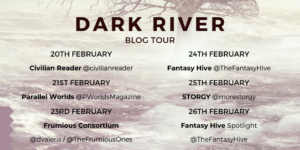Dark River tells the tales of two women, separated by millennia but whose struggles eerily echo one another’s as they both embark on perilous migrations in the face of environmental disaster. Shaye is a Neolithic woman whose tribe is concerned at the way the waters of their plenty time place have begun to run from instead of to the ocean, fouling the water and driving away game. When an initiate of the sacred oak grove where they usually winter comes asking them to make the pilgrimage early, so they may try to appease the spirits with a grand ritual, Shaye willingly agrees, as it seems her best chance at being reunited with Marl, the man she loves and father of her son, Ludi.
In an England some decades from now, Shante is waiting for the visas that will allow her family to join her husband up in a northern city safer from the ravages of the rising seas. When the visas finally come through, she and her sister Grainne and her son Locke prepare to leave the world they’ve always known… only to find that greater danger awaits them on their path than in the crumbling city they’d left behind.
I finished reading Dark River while on a weekend trip at 4 a.m. and immediately wanted to call my husband to have him wake the kids so I could tell them I love them. Of course, since it was ridiculous o’clock and no one at home would have appreciated the gesture, I did not. Now, I am ordinarily quite susceptible to books making me want to be more loving towards my kids, but this book made my heart hurt in a new way. I imagine it’s how people who enjoyed Cormac McCarthy’s The Road felt. For the record, I thought The Road was self-congratulatory nonsense: Dark River, on the other hand, showcases the love of a person for her family, and especially her child, without turning it into an unsightly display of wallowing masochism, even in the face of terrible odds.
And that, I think, is why Dark River hurt me so much, because it drives home the fact that there are no guarantees. There are only so many things we can do to safeguard our families. So many things are out of our hands, making it even more important for us to tell the people we love that we love them while we can. And for all that, Dark River isn’t a book without hope. It’s still important to try, to use the lessons of the past in order to keep surviving.
 My only quibble with the novel was with the end of Shante’s story. I was surprised that her thoughts turned to her dad instead of her son, given the circumstances. Perhaps she wanted to take her mind off her grief, but it felt like an oddly abrupt change of subject given what we knew of her. I did however very much like how the narratives weren’t entirely in lockstep, with the differences only making each character feel that much more realistic and relatable.
My only quibble with the novel was with the end of Shante’s story. I was surprised that her thoughts turned to her dad instead of her son, given the circumstances. Perhaps she wanted to take her mind off her grief, but it felt like an oddly abrupt change of subject given what we knew of her. I did however very much like how the narratives weren’t entirely in lockstep, with the differences only making each character feel that much more realistic and relatable.
Dark River is Rym Kechacha’s debut novel and is just an absolute masterpiece of speculative eco-fiction. To read more about this terrific novel, check out the other sites on the blog tour listed in the handy infographic above.

